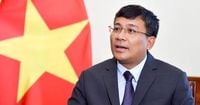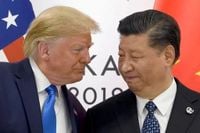In a significant diplomatic move, President Donald Trump's administration is reportedly engaging in negotiations aimed at pressuring U.S. trading partners to limit their ties with China. According to a report by the Wall Street Journal, this strategy is designed to isolate China's economy in exchange for reduced trade barriers and tax incentives from the White House.
The plan involves discussions with over 70 countries, urging them to prevent Chinese exports from transiting through their territories, thereby obstructing Chinese companies from relocating to avoid U.S. tariffs. This strategy aims to further squeeze an already faltering Chinese economy and compel Beijing to negotiate from a position of weakness.
During a recent Fox News interview, Trump hinted at this approach, stating he would allow countries to choose between the U.S. and China. This remark came in response to Panama's decision to withdraw from participating in China’s Belt and Road Initiative (BRI), a global infrastructure project aimed at developing nations.
Scott Besent, the U.S. Treasury Secretary and a key figure in trade negotiations, reportedly proposed this strategy to Trump during a meeting at Mar-a-Lago on April 6. Besent emphasized that pressuring trading partners could effectively hinder Chinese companies from circumventing U.S. tariffs and other economic measures.
Despite ongoing debates regarding the scale and intensity of U.S. tariffs, many officials appear to support Besent's plan to target China. This initiative may involve excluding China from the U.S. economy through tariffs and potentially delisting Chinese stocks from U.S. exchanges.
However, the ultimate objectives of the U.S. government regarding China remain unclear. Besent noted that there is still room for trade negotiations between the U.S. and China, suggesting that talks could occur between Trump and Chinese President Xi Jinping.
Caroline Livett, a White House communications secretary, indicated that recent statements from Trump suggest that a deal with China is not imminent. "Right now, it’s up to the Chinese. They want to make a deal with us; we don’t want to make a deal with them. They want what we have, which is American consumers," Livett stated during a press conference.
It is also uncertain whether this anti-China approach will be integrated into negotiations with all countries. Some nations have reported not hearing any demands regarding China from U.S. negotiators, acknowledging that discussions are still in preliminary stages. It is anticipated that the Trump administration may soon introduce demands concerning China as a negotiating condition.
Meanwhile, China is actively pursuing its own trade diplomacy. This week, President Xi visited Vietnam, a key U.S. trading partner that has faced significant tariffs from Trump. During this visit, China signed multiple economic agreements with the Vietnamese government.
In a separate but related development, the Deputy Minister of Foreign Affairs of Vietnam, Nguyen Minh Vu, stated that Xi's visit was highly successful in all respects. He highlighted that the visit, which took place from April 14 to 15, 2025, was a significant foreign affair, contributing to the comprehensive strategic partnership between Vietnam and China.
Vu emphasized the importance of the visit, particularly as it coincided with the 75th anniversary of diplomatic relations between the two nations. Vietnamese leaders warmly welcomed the Chinese delegation, demonstrating mutual respect and friendship.
During the visit, both sides engaged in productive discussions on bilateral relations, regional issues of mutual concern, and participated in various community activities to strengthen people-to-people ties.
Both nations agreed to enhance their strategic partnership, with Vietnam prioritizing cooperation with China in its foreign policy. They also committed to establishing cooperative relationships across various fields, including transportation infrastructure, agriculture, science, technology, and the digital economy.
Moreover, both parties agreed to form a joint task force to promote railway cooperation between Vietnam and China, including the construction of several key railway projects. This cooperation aims to create a robust foundation for future collaboration.
Vietnam reaffirmed its commitment to enhancing its partnership with China, viewing it as a critical task. The two countries aim to work together to foster deeper ties and mutual benefits.
As both nations move forward, they are determined to address shared concerns and challenges, particularly in the context of an evolving global landscape. The outcomes of Xi's visit and the ongoing negotiations between the U.S. and its trading partners will undoubtedly shape the future of international trade dynamics.
Overall, the recent developments highlight the intricate web of international relations, where economic interests, diplomatic engagements, and strategic partnerships play crucial roles. The U.S. and China remain at the center of these discussions, with their actions influencing the broader geopolitical landscape.





